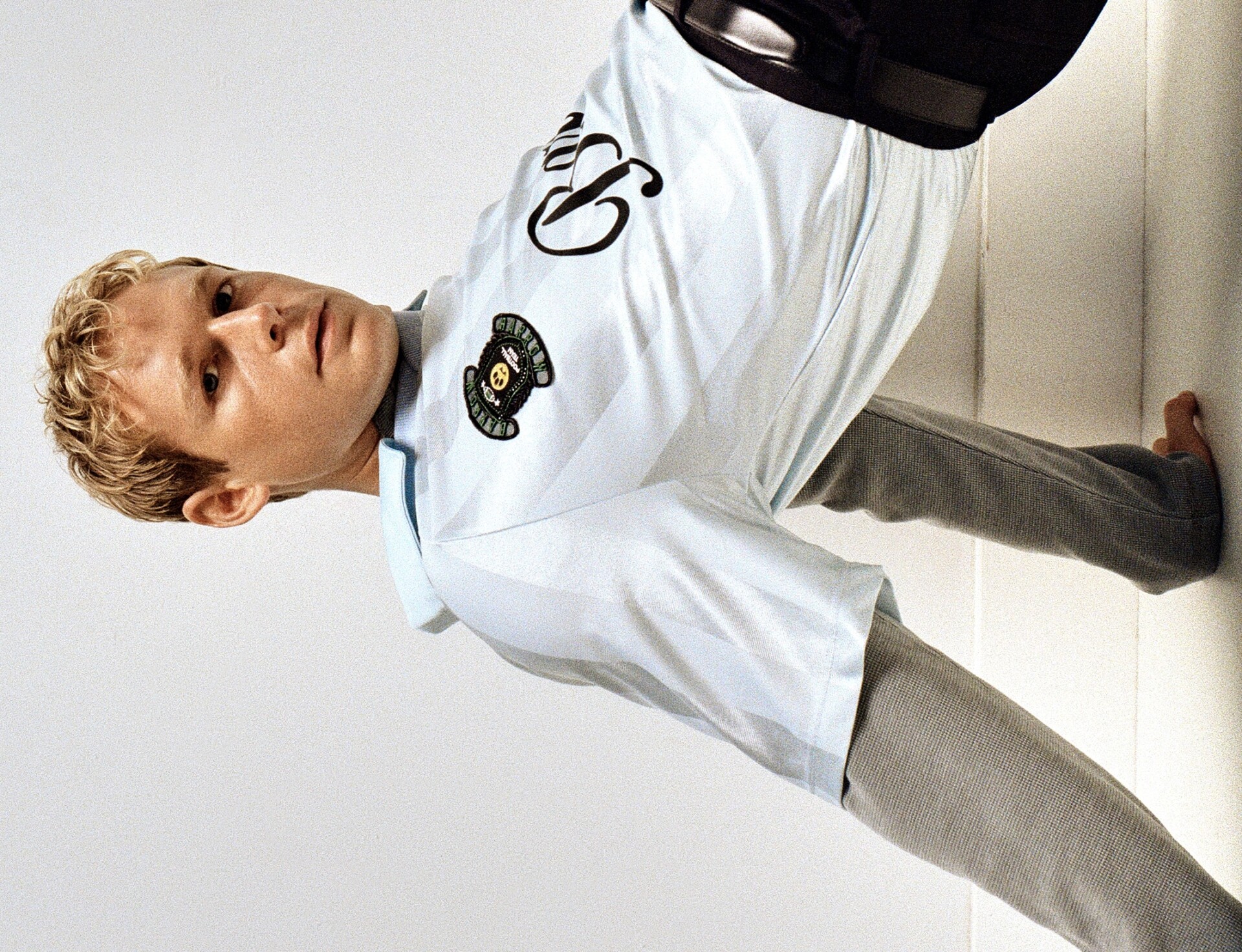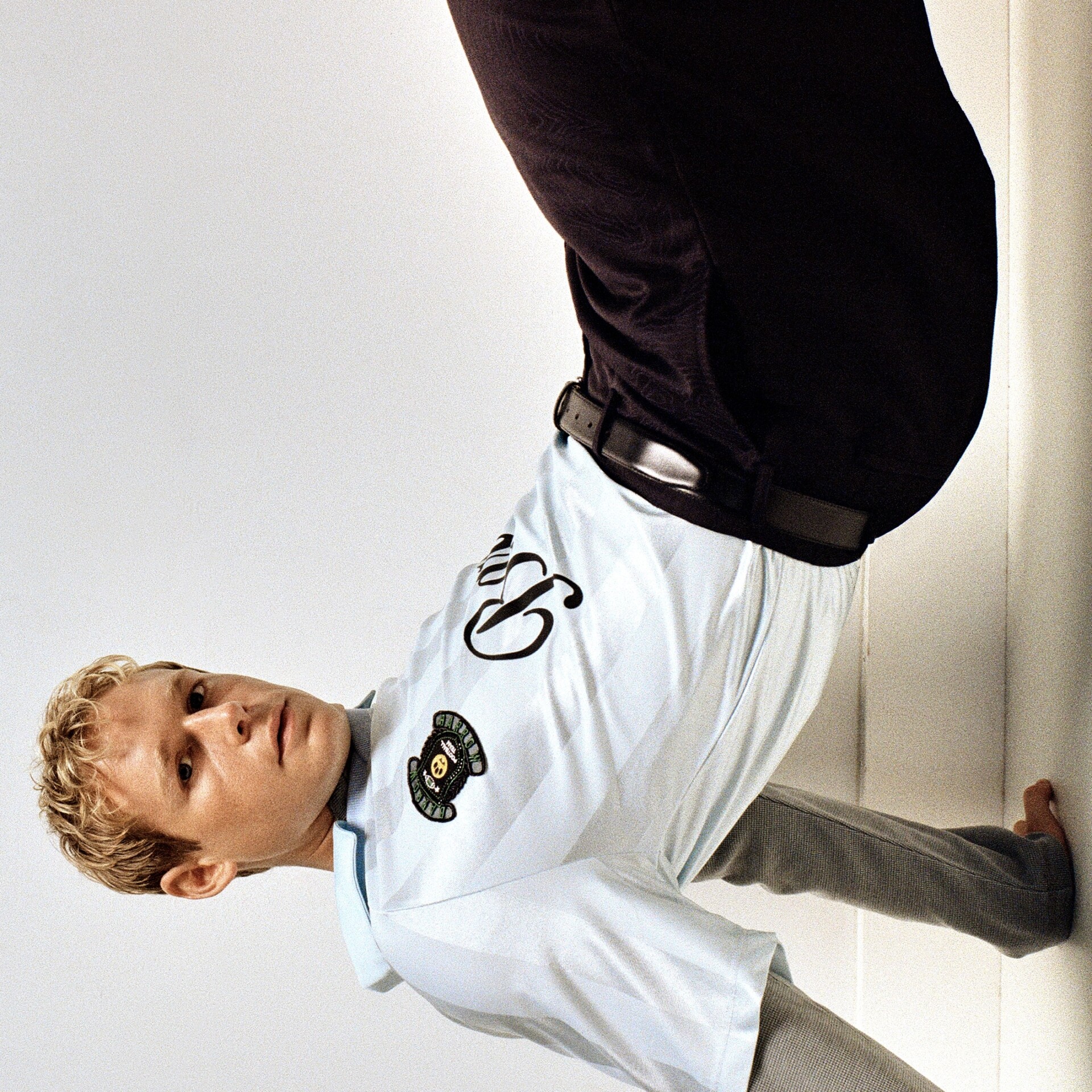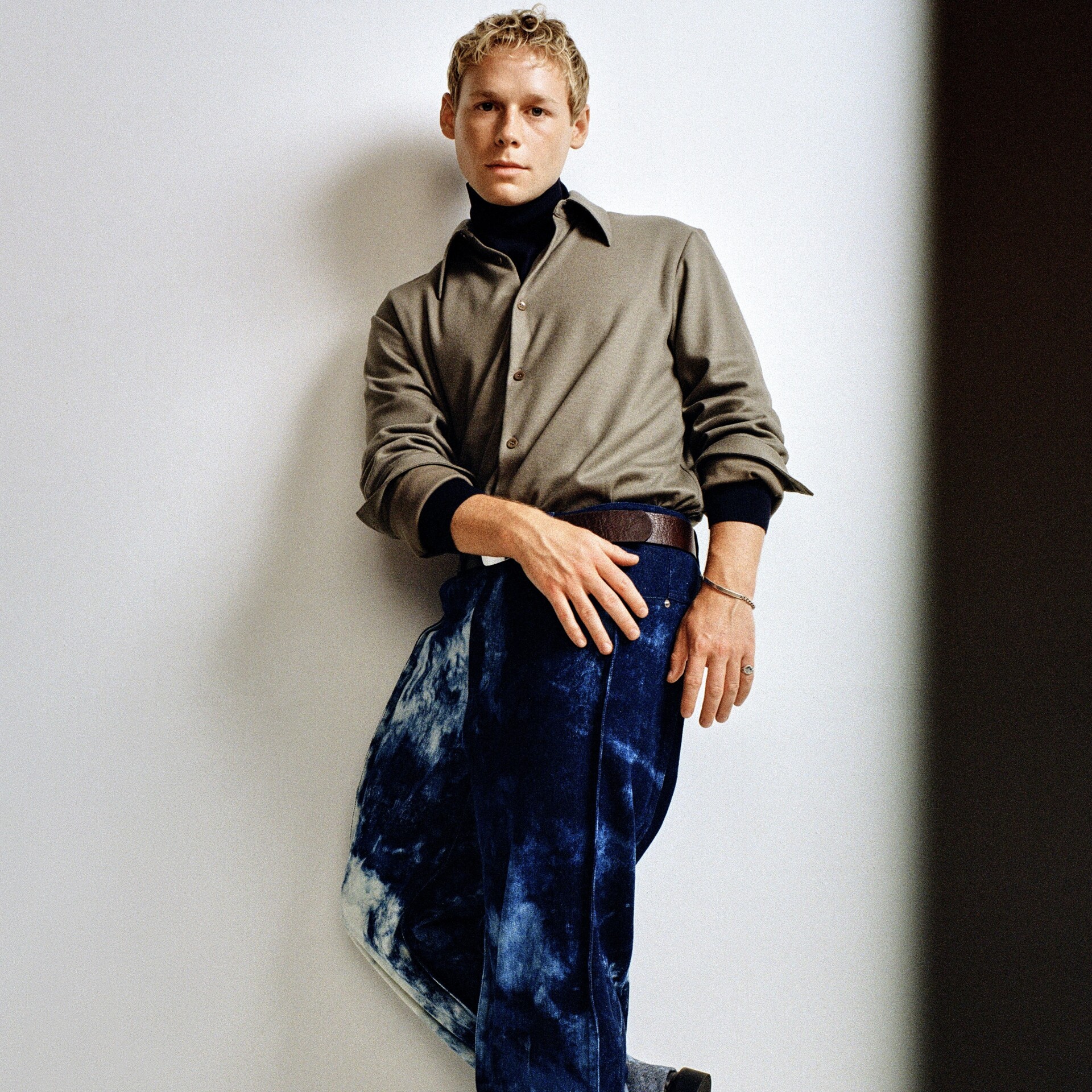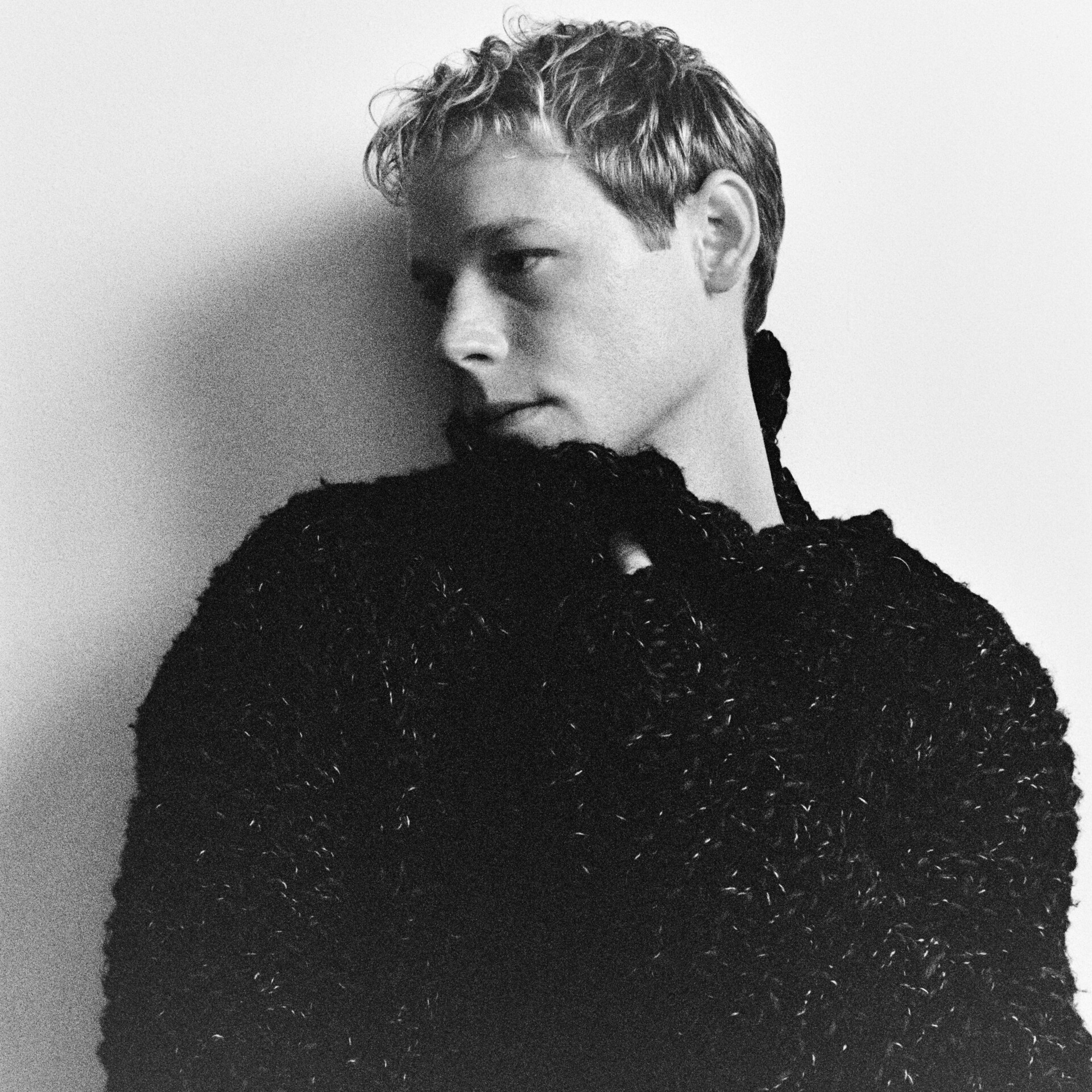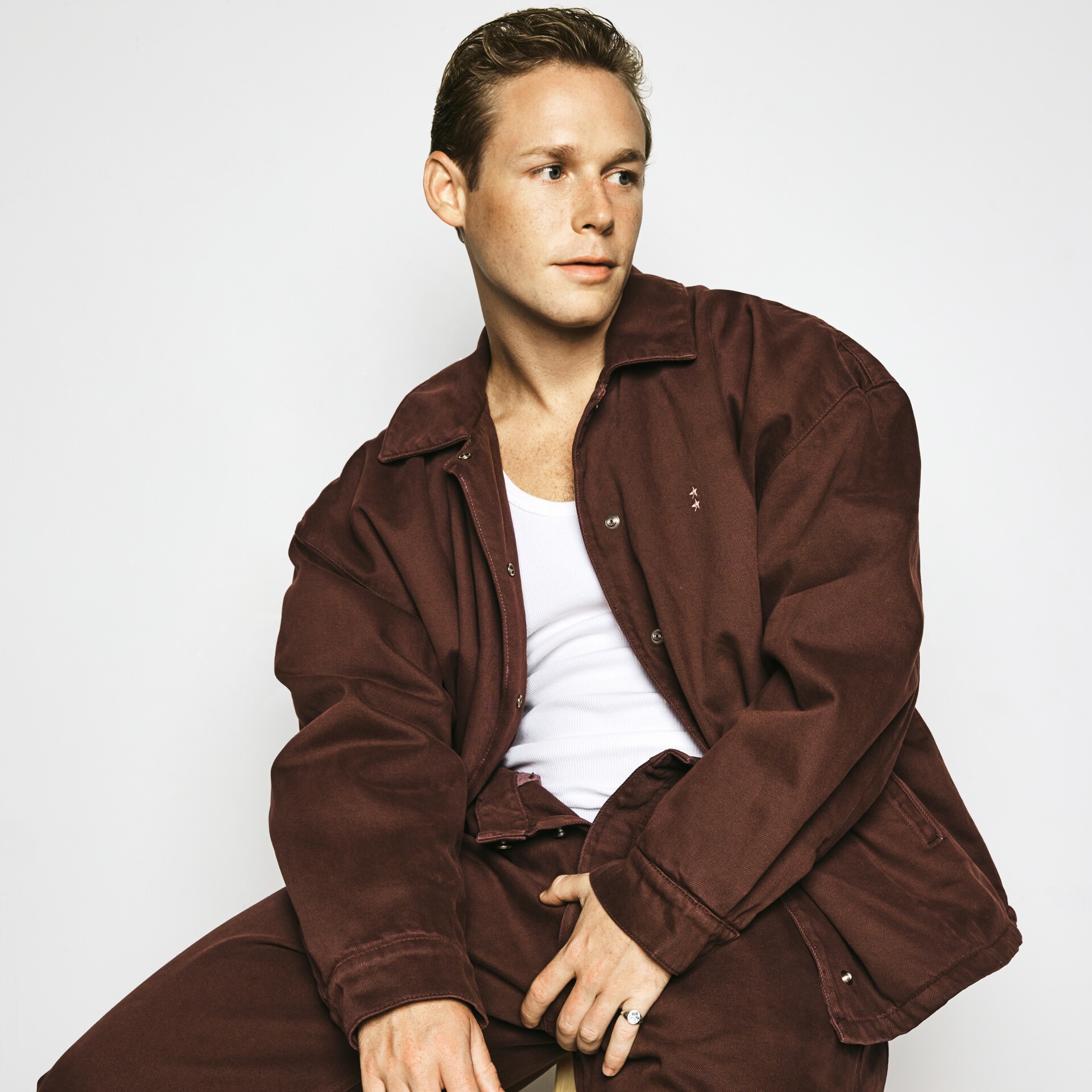By Phillza Mirza
COLE DOMAN: VULNERABILITY, FEARLESSNESS, AND FINDING COMPLEXITY IN THE MASTERMIND
It’s a grey Friday afternoon when Cole Doman joins our call, dialling in with the kind of calm presence that feels rare in an industry often defined by noise. Known for roles that carry both raw vulnerability and striking strength, he’s quickly become a name synonymous with stories that cut deeper than the screen. After eight months on Apple TV+’s much-anticipated The Savant alongside Jessica Chastain, Doman could easily rest on the prestige of his new project. Instead, he’s thinking about risk, resilience, and what it means to keep pushing into new territory.
We talk about everything: theatre beginnings, queer storytelling, and the difficult balance between empathy and darkness. At every turn, Doman comes across as quietly fearless, though he’ll be the first to tell you that fearlessness only exists because of vulnerability.
Phillza Mirza: You’ve trained in both theatre and film. How does live performance inform the way you approach screen work? Do you find yourself craving that immediate connection with an audience?
Cole Doman: I was working on The Savant for eight months, and when it wrapped, I was asked to do an experimental off-Broadway play in New York. I was so excited because after being on a TV set, that return to the theatre felt electric again. People who do theatre definitely crave that instant connection; the cheers, the breath of the audience, their responses. But my goal has always been to do all three: theatre, film, and television. Each one feeds a different part of me. Theatre shaped the way I act; it taught me discipline, because you have less time. That immediacy lives in me even when I’m on set.
PM: You’ve been described as someone who brings both vulnerability and strength to your roles. Do you feel more connected to one side of yourself?
CD: I would say that the vulnerability came maybe a little bit easier to me. I was a very sensitive kid, and so I think I was able to tap into that earlier on. The fearlessness has come through, I think, as I’ve built trust with myself and released control about what the performance should be and relied on my directors and writers to say, okay, if you think I can do this, I’ll give it everything I have, I’ll throw it all out the window. And that’s been whenever I’ve been able to get myself there and do that, it’s the greatest payoff, not only for the final product, but also just becoming more skilled as an actor. In the end, I think that they coexist with each other because fearlessness really requires vulnerability to fail. And if anything, acting is about being totally comfortable with failure, you know?
PM: In Henry Gamble’s Birthday Party and Uncle Frank, you helped tell deeply queer stories. How has living openly shaped the roles you take and the way you approach them?
CD: When I started out, about 15 years ago, being out felt really valuable, almost urgent, because visibility was rare. There’s a reason I mostly started my career in theatre: I didn’t even think being in movies was possible for me. When it did happen, I wanted to be open about who I was. Now the industry is more inclusive, so my identity feels less like a precious thing I need to protect. I want to play any role I can, but if I’m doing a queer project, it has to say something new. So I think when these roles come to me, because they do and I’m so grateful, It’s a balancing act. I want to challenge myself as an actor and I’m always looking for the next big challenge. And if that is in a queer film with an amazing director who has something really specific to say, then I’m all on board. We’re such complex people. And of course being gay is a huge part of who I am, but it’s not the only part of who I am.
PM: Your new project The Mastermind has been described as a darkly compelling story about ambition, morality, and survival. What drew you to this project, and what can audiences expect from your role in it?
CD: The immediate draw for me was to work with Kelly Reichard, whose work I’ve been a massive fan of since I first saw Wendy & Lucy about 15 years ago. I’ve watched all of her films with great admiration. The script was humorous but also menacing, and I was excited about the chance to work alongside Josh O’Connor. My role is certainly different from what people may expect from me.
PM: How did working on The Mastermind differ from your past projects, either in terms of the character you play, the story’s themes, or the overall atmosphere on set?
CD: First, on a practical level, I worked with the great Liz Himelstein to be able to lock into the Worcester, MA dialect. Then once I got to set, Kelly creates an environment that is somehow both relaxed but also diligent. She’s been working with a lot of the same crew since the beginning of her career, so there’s a shorthand everyone has with each other. Once Kelly is happy with the take, we move on. I love a director who knows how to economize everyone’s time and energy – it takes confidence and skill to be able to do that. And she certainly has both of those things.
PM: So talking about your other new project that you’ve completed, congratulations, by the way. Let’s talk about The Savant. What drew you to it personally, its story, and your character in it?
CD: Honestly, when I saw Jessica Chastain was attached, I was a super fan already. Then I learned Melissa James Gibson, a playwright I admired in New York, was writing, and Matthew Heineman, who usually works in documentaries, was directing. I thought, what an interesting group of artists. The story itself felt layered, complex. My character, Steve, was nothing like me, to the point where my agent had to reassure me, “They know what you look like; don’t worry.” That challenge was exciting.
For me, Steve’s struggle with masculinity and belonging resonated. He wants a family, love, authority over his life, but he doesn’t have the tools. That kind of lack makes him vulnerable to indoctrination and hateful rhetoric. I don’t condone his choices, but I understood the outsider energy he carries. I’m not interested in playing someone who’s just hateful for the sake of it. I want to find humanity, even in the darkest corners.
PM: Without giving too much away, do you think audiences will see a new side of you in this performance?
CD: Absolutely. Five years ago, I don’t know if I would’ve believed I could play this role. But I’ve been building towards that kind of fearlessness we talked about earlier. I’m throwing it all at the wall. If it doesn’t land, fine. But I gave it everything. And I think people will be surprised.
PM: Beyond The Mastermind and The Savant, what kinds of stories do you think are missing from the cultural conversation?
CD: I think the problem is that studios aren’t taking enough risks on young talent, especially black and brown voices, LGBTQ voices. If more diverse people were at the top with the money, that money would flow into new, exciting stories we don’t even know exist yet. That’s what excites me: the scripts that land in my inbox that feel completely unfamiliar, that don’t just recycle the same machine. With IP culture and superhero fatigue, audiences are ready for something new.
PM: So let’s get into fashion a little bit. How would you say that fashion factors into your self expression? And is it your armor? Is it your storytelling? Or is it simply something you like to have fun with?
CD: I’ve always loved fashion. It was a way, when I was younger, to differentiate myself from the banality of suburban Philadelphia. It was declarative. It was saying, ‘I don’t belong here. I need to get my ass to New York City’. And so when you speak about armor, I think it was actually more punk than that. When I was younger, it was like, you will see me in an expression that makes you maybe feel a certain type of way. And now it’s something that I admire more, mostly as this incredible expression of art. How I choose to self express says a lot about who you are and I think that that is tied to being an actor. How do you want the world to see you? What a powerful thing to have some choice in that. What do I want to be putting out into the world? And that’s made available mostly through fashion because it’s the first thing that people look at when they see you. What are you wearing? Immediately people can sink into that. They can place you, they can understand you, they can judge you. And I don’t mean that in a pejorative sense. I mean it in a connective sense. Also I just love the luxury of it. I think it’s fabulous.
PM: Lastly, what’s the best piece of advice a friend or mentor has given you?
CD: If we’re talking about acting techniques, there’s an expression: hold on tightly and let go lightly. So hold on to your intention as fully as you possibly can and the minute something else comes into your orbit that moves you, let go of it as soon as you can and move on to the next thing and hold on to that really tightly. It’s like taking everything personally, moving through things. That expression really landed for me.
I also had a teacher when I was studying at Steppenwolf, Audrey Francis, and she’s now the artistic director of Steppenwolf. I think I was struggling a little bit with getting these contemporary American plays sent to me and feeling like- especially back then, having a little bit more insecurity about being a gay male actor. I was like, oh, there’s not a role for me. I don’t feel like I can do this. And she said, if the play doesn’t explicitly say this role is written for a six foot five black man. Essentially, if there’s no physical attributes that prevent you from playing this part, there is a version of that play that exists with you in it. A version. And that sort of unlocked the door for me. I realised I don’t have to be the idea of what I think this should be. I just need to play this part. I know how to do it. Because maybe somewhere someone is going to say, that’s the version of the play that I want to see.
_____
Cole Doman has a way of threading empathy and thoughtfulness into every answer, even when he’s talking about a character whose actions repel him. Vulnerability and fearlessness, in his telling, aren’t contradictions but a symbiosis, one feeding the other. As The Savant prepares to land, audiences will meet a version of Doman they haven’t seen before. One who refuses to flatten even the darkest characters into caricature, insisting instead on finding humanity where most would look away.
Talent COLE DOMAN
Photographer BRENDAN WIXTED
Hairstylist CHIKA NISHIYAMA
MUA YUUI VISION
Stylist KIMBERLY NGUYEN Kimberly Nguyen
Styling Assistant DANIEL JACINTO DA SILVA
Editorial and creative Director HUW GWYTHER
Editor-in-Chief OLIVE WALTON
Photo Editor & Production Director EMMA CHRISTOPHER
